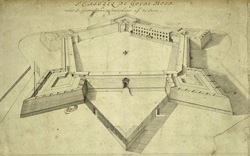This Day in History: April 26, 1679
Additional Date: April 26, 1679
The Castle of Good Hope is the oldest surviving colonial building in South Africa. Built between 1666 and 1679, the castle replaced a small clay and timber fort built by Commander Jan van Riebeeck in 1652, upon establishing a maritime replenishment station at the Cape of Good Hope for the Dutch East India Company (VOC). The main reason for building the castle was to provide protection to the new settlement. Therefore, it was built in accordance with 17th century European principles of fortification, comprising five strong bastions that allowed the outside walls to be protected by cross-fire. Construction on the Castle of Good Hope was complete on the 26 April 1679, and the five bastions were named after the main titles of Willem, the Prince of Orange. The Western bastions was named Leerdam; followed in clockwise order by Buuren, Catzenellenbogen, Nassau and Orange. From 1678, the castle was the centre of civilian, administrative and military life at the Cape, until the settlement grew and some functions and activities moved away from the Castle. Today the Castle is the seat of the military in the Cape, and houses the Castle Military Museum and Iziko Museums Cape Town (William Fehr Collection).
